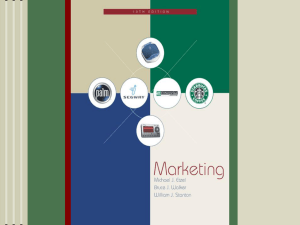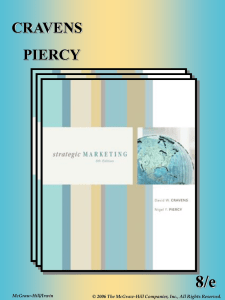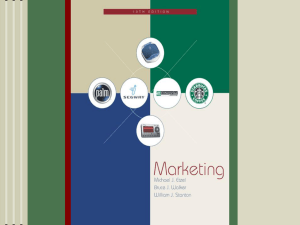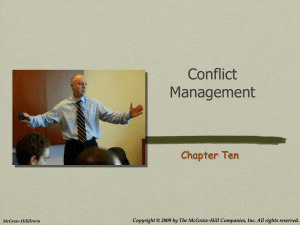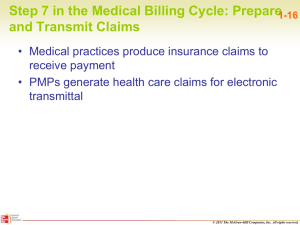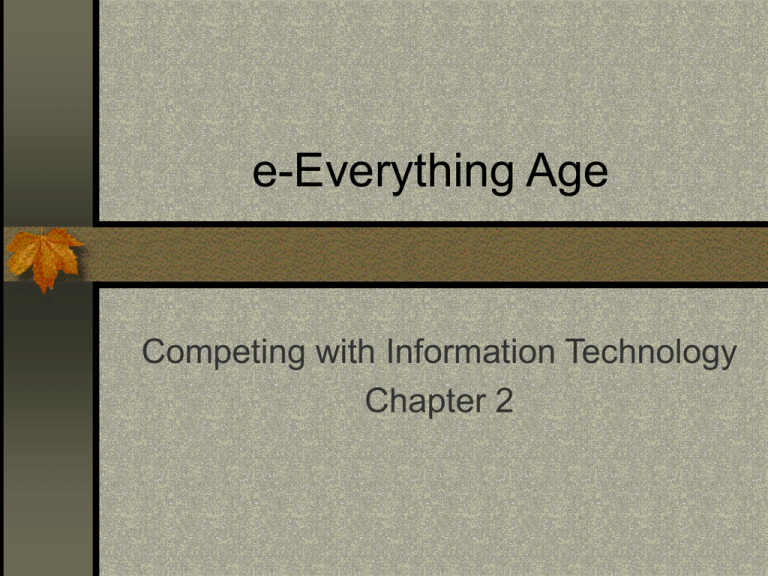
e-Everything Age
Competing with Information Technology
Chapter 2
James A. O’Brien
Introduction to Information Systems
Eleventh Edition
2
Chapter Objectives
• Identify competitive strategies of
information technologies.
• Give examples of how business process
reengineering frequently involves the
strategic use of e-business technologies.
• Identify the business value of using ebusiness technologies
Irwin/McGraw-Hill
Copyright © 2002, The McGraw-Hill Companies, Inc. All rights reserved.
3
The Age of Networked Intelligence
Not just networking of technology but it
is about the networking of humans
through technology
Digital Economy
Individuals and enterprises create
wealth by applying knowledge,
networked human intelligence, and
effort to manufacturing, agriculture, and
services
Knowledge Economy
Based on the application of human know
how
Life long learner
“SMART” products
Economy added value will be created by
brain not brawn
Mass Customized rather than massproduced (Boutique Bakers/Garden
scents)
Mass Customization
One of the most
successful models of eCommerce is mass
customization.
the production of large
quantities of
customized items.
It supplements or even
replaces one of the most
innovative concepts of
the Industrial Revolution,
mass production.
Mass customization
can be facilitated by
the Web in four
different approaches;
Collaborative
customizers
Adaptive
customizers
Cosmetic
customizers
Transparent
customizers
7
Example of customization
8
Home Depot
Online Design Tools
9
Organization Structure
Need for new structures…..
Information Technology
Information technologies are flexible tools,
constrained primarily by managers’ will to use
them, expectations about their roles, and
applications choices.
Cash p.267
11
Organization Structure
Division of Labor
Who
does what?
Division of Decision Rights
Who
should make which decision?
Coordination Mechanisms
Organizational Boundaries
Informal Structures
12
James A. O’Brien
Introduction to Information Systems
Eleventh Edition
13
Strategic Uses of Information Technology
Strategy
IT Role
Outcome
Irwin/McGraw-Hill
Raise
Barriers
to Entry
Increase
amount of
investment or
complexity of
IT needed to
compete
Increase
Market Share
Build a
Strategic IT
Platform
Locking in
Customers
and Suppliers
Leverage
investment in
IS resources
from operational uses to
strategic uses
Use IT to
improve quality
Use IT to link
business to
customers and
suppliers
Create New
Business
Opportunities
Enhance
Organizational
Collaboration
Copyright © 2002, The McGraw-Hill Companies, Inc. All rights reserved.
Strategic Information Systems
Cost leadership
Differentiation
Supports strategic changes – like
reengineering
Growth
Innovation
Provide business intelligence by
collecting and analyzing information
Improve internal efficiency
Customer-oriented approaches
14
James A. O’Brien
Introduction to Information Systems
Eleventh Edition
15
The Internet Value Chain
Internet
Capability
Marketing and
Product
Research
Benefits
to
Company
Data for
market
research,
establishes
consumer
responses
Opportunity
for
Advantage
Irwin/McGraw-Hill
Increase
Market Share
Sales and
Distribution
Support and
Customer
Feedback
•Low cost
distribution
•Reaches new
customers
•Multiplies
contact points
•Access to
customer comments online
•Immediate response to
customer
problems
Lower
Cost Margins
Maintain Valuable
Customers and
Relationships
Copyright © 2002, The McGraw-Hill Companies, Inc. All rights reserved.
James A. O’Brien
Eleventh Edition
Introduction to Information Systems
16
Customer-Focused e-Business
Let customers
place orders
directly
Let customers
check order history
and delivery status
Build a
community
of customers,
employees,
and partners
Let customers
place orders thru
distribution
partners
Customer
Database
Transaction
Database
Give all
employees a
complete view
of customers
Irwin/McGraw-Hill
Link Employees
and distribution
partners
Copyright © 2002, The McGraw-Hill Companies, Inc. All rights reserved.
Customer Service on the Web
Providing Search and
Comparison
Capabilities.
Allowing Customers to
Order Customized
Products and Services
Online.
Providing Free Products
and Services.
Providing Technical and
Letting Customers
Track Accounts or
Order Status
Other Information and
Service.
17
Tools for Customer Service
Personalized Web
Pages
E-mail and
Automated
Response
FAQs
Tracking Tools
Chat Rooms
Help Desks and
Call Centers
Troubleshooting
Tools
18
James A. O’Brien
Introduction to Information Systems
Eleventh Edition
19
Strategic Positioning of Internet Technologies
High
Global Market
Penetration
Product and Services
Transformation
Strategy
E-Commerce Website
Value-added IT Services
E-Business; Extensive
Intranets and Extranets
Solution
Cost and
Efficiency
Improvements
Performance
Improvements in
Business
Effectiveness
E-Mail, Chat Systems
Low
Intranets and Extranets
E-Business Processes Connectivity
Internal Drivers
Irwin/McGraw-Hill
High
Copyright © 2002, The McGraw-Hill Companies, Inc. All rights reserved.
Reengineering….
BPR, Process Innovation, ERP,
Mass Customization, Networked
Organization, Empowerment, Teams,
Virtual Corporations, TQM, JIT, POM,
BPM, CRM
Reengineering the Corporation
Written - 1993
Michael Hammer
One
of 1996 most influential people in the
U.S.
Time Magazine
July 17,1996
James Champy
21
What is Reengineering?
“the fundamental rethinking and radical
redesign of business
processes to achieve dramatic
improvements in critical,
contemporary measures or
performance, such as cost,
quality, service, and speed”
p. 32
22
24
Impacts
Company
Customers
Employees
Increase
Teams
Benefit from
product by an better product Less Workers
order of
- More Work
Needs are
magnitude
Empowered
met
Examine
Layoffs
Tendency to
process
return
Vision
Loyalty
Increase
Profits
25
To reengineer a company is to take a
journey from the familiar into the
unknown. The journey has to begin
somewhere and with someone. Where
and with whom?
P.
101
26
Business Process Reengineering
Initially,
attention was given to a complete
restructuring of organizations.
Later, the concept was changed due to
failures of BPR projects and the emergence
of Web-based applications.
Today, BPR can focus on anything from the
complete restructuring of an organization to
the redesigning of individual processes.
Major objective of BPR = Information
Integration.
27
Bell Atlantic’s Experience
The difference is that in a compliance mode
I do what I must do because my boss tells
me I must do it. In a commitment mode, I
understand what the corporation is trying to
achieve and how we’re going to achieve it,
and I will do whatever it takes to make that
happen, including changing the way I do my
job if that is what is required
p. 196/197
28
BPR
No longer a need to destroy
everything - start from scratch
Instead - Flexible approach that can
be executed by proven
methodologies and principles.
Hammer and Stanton[1995]
& Champy [1995]
29
Process Innovation
Encompasses the envisioning of new
work strategies, the actual process
design activity, and the implementation of
the change in all its complex
technological, human, and organizational
dimensions – order-of-magnitude
improvements
Davenport (1993)
30
James A. O’Brien
Introduction to Information Systems
Eleventh Edition
31
Business Reengineering and Quality Management
Business Quality
Improvement
Definition
Target
Potential
Payback
Risk
What Changes?
Primary
Enablers
Irwin/McGraw-Hill
Business
Reengineering
Incrementally Improving
Existing Processes
Radically Redesigning
Business Systems
Any Process
Strategic Business
Processes
10%-50% Improvements
10-Fold Improvements
Low
High
Same Jobs - More Efficient Big Job Cuts; New Jobs;
Major Job Redesign
IT and Work Simplification
IT and Organizational
Redesign
Copyright © 2002, The McGraw-Hill Companies, Inc. All rights reserved.
James A. O’Brien
Introduction to Information Systems
Eleventh Edition
32
Chapter Summary
• Information systems can play several
strategic roles in business.
• Using the Internet, intranets, extranets,
and other Internet-based technologies as
a strategic competitive advantage for ebusiness and e-commerce
• Build the an e-business model by making
customer value its strategic focus.
Irwin/McGraw-Hill
Copyright © 2002, The McGraw-Hill Companies, Inc. All rights reserved.
James A. O’Brien
Introduction to Information Systems
Eleventh Edition
33
Chapter Summary (cont)
• IT is a key driver in changing and streamlining
business processes.
• IT can be strategically used to improve the
quality of business performance.
• A business can use IT to help it become an
agile company, that can respond quickly to
changes in its environment.
Irwin/McGraw-Hill
Copyright © 2002, The McGraw-Hill Companies, Inc. All rights reserved.


